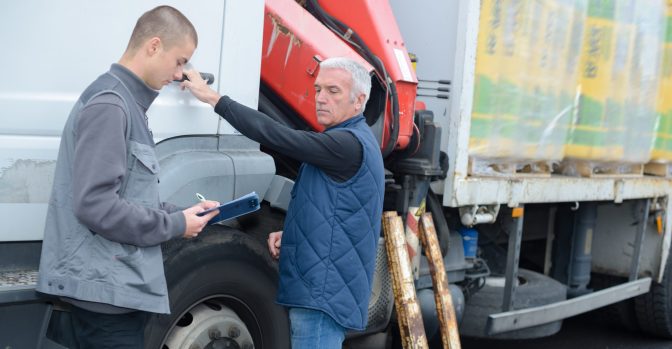International Roadcheck 2023: What Shippers and Receivers Need to Know
The latest news
The Commercial Vehicle Safety Alliance (CVSA) will hold the 2023 International Roadcheck May 16-18. The event is often called “Blitz Week” in the industry and is rapidly approaching, affecting all trucking types, from dry van to drayage for intermodal services. Plus, drivers may already be eyeing the dates with plans to take off or rest. Thus, it carries an added weight for shippers as trucks and drivers may receive a vehicle out-of-service (OOS) designation. Let’s take a closer look at what the event is, what it means for drivers, and what shippers and receivers need to do to be ready.
What Is International Roadcheck?
The CVSA Roadcheck, or International Roadcheck, is a 72-hour blitz during which enforcement officers conduct inspections of commercial motor vehicles and drivers at weigh stations, designated areas, or even alongside roadways, i.e., a roadside inspection. The event is technically part of several annual DOT Blitz weeks that aim to promote vehicle and driver safety and compliance among all North American trucks and drivers. Data obtained from inspections conducted during the blitz provides a snapshot of the compliance health of all North American trucks and drivers and helps improve road safety. The CVSA will also share the official results of the blitz later this year. But, what exactly is typically covered during the inspections?
What’s Covered During Inspection?
The focus for the 2023 CVSA Roadcheck is on anti-lock braking systems (ABS) and securement. Both areas significantly impact the safety of drivers, others on the roads, and those charged with loading/unloading cargo. However, there is a unique facet to this year’s event.

An ABS violation doesn’t equate to an overall driver out of service or additional service violations. But drivers found in violation may have an inspector take additional time to check other potential hazards. Remember that the ABS is responsible for preventing brakes from locking up or skidding and helps the driver to maintain control. The truck's maneuverability and safety decline without a prevention mechanism to prevent wheels from locking. The ABS should be in working order at all times. Period. Still, a failure to pass the ABS criterion might give an inspector additional reason to assess other service criteria with added scrutiny.
Cargo securement is the other primary area of focus for 2023. Proper lashing and securement ensure the truck's stability and maneuverability, but they are also crucial to ensuring the safety of other drivers, teams, and passersby. Poor securement means a higher risk of injury. . It’s that simple. So the next question is obvious: "What are the top areas of inspection beyond the ABS and securement for this year?"
As explained by the CVSA, the following core areas are subject to the Level I inspection program criteria during International Roadcheck:
- Vehicle safety – Inspections will predominantly focus on vehicle brake systems, securement, coupling devices, driveline and driveshaft components, the driver’s seat, including proper safety restraints (seat belts), fuel and exhaust systems, suspension systems, lighting devices and systems, steering mechanisms, tires, rims, hubs, and windshield wipers.
- Driver safety – The driver as a person and their behaviors are also subject to inspection. The assessment includes a review of hours-of-service logs and documentation, status in the drug and alcohol clearinghouse, current ability to handle and operate a CMV safely, and whether the driver is wearing a seat belt.
Failures to the above may lead to an OOS designation, but passing the inspection means drivers receive a CVSA decal. The decal is valid for three months to effectively clear the truck and driver from future inspections. For large networks, such as those working with a semi broker to find loads, getting back on the road will be easier.
It's equally important to understand that inspections are categorized into different tiers, from Level I, such as those checked during Blitz week, through the more advanced Level V assessment. International Roadcheck will primarily focus on Level I inspection criteria, but that doesn’t mean a failure to adhere to possible requirements within Level V inspections will prevent an OOS designation.
Of course, there will always be additional opportunities for OOS designation, mainly if a driver exhibits dangerous behavior that results in being “pulled over” for inspection. For example, if a driver is found to have been using drugs or alcohol, they could receive an OOS designation and possibly face legal consequences for such offenses.
What Does International Roadcheck Mean for Drivers?
International Roadcheck is a positive improvement for the industry, but some drivers know their trucks won't pass the inspection. Due to the tightening economy and other risks, these drivers might avoid driving during this three-day window. They will keep away from the roads and take a vacation to prevent potential OOS designation. This is the only absolute way to avoid inspections, which has a major implication for shippers and receivers and their needs for a third-party logistics brokerage.
What Does the Blitz Mean for Shippers?
Fewer motor carriers, i.e., drivers and trucks, on the road mean less available capacity. With the event mere days away, knowing its dates and expectations for the industry will put shippers and receivers on edge. During international roadcheck, there is a higher risk of delays on tendered loads and higher rates for drivers still in service and with great inspection records. Thus, the only real solution is for shippers and receivers to have a clear plan for sourcing capacity and diversifying their networks with new freight broker partnerships.
Choose GEODIS Capacity Solutions to Augment Your Trucking Procurement Now.
GEODIS Capacity Solutions is in a great position to mitigate risks from this year’s DOT Blitz week. Shippers and receivers that need additional capacity can leverage the GEODIS network of more than 25,000 carriers and ensure optimum coverage throughout this inevitable disruption. Of course, that also includes finding available trucks and drivers at the right price point. Don’t put your freight at risk. Connect with a GEODIS Capacity Solutions sales representative to get started.
Latest News




Categories
